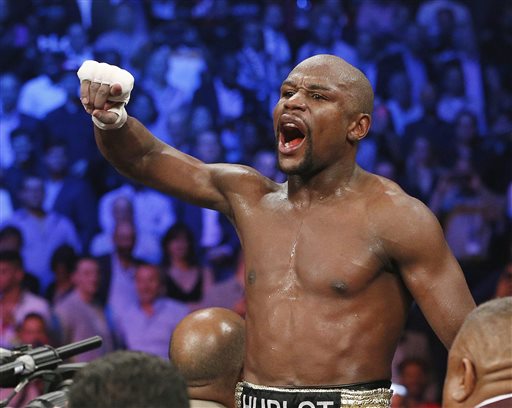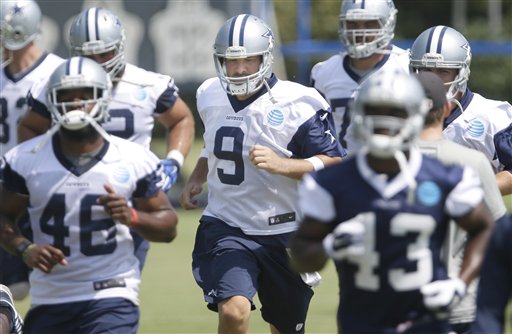After months of intense negotiations, the deal has finally closed. As first reported by TMZ, the Ultimate Fighting Championship was sold for $4 billion to talent agency WME-IMG in the single biggest transaction in sports history.
Zuffa, led by siblings Lorenzo and Frank Fertitta, purchased the failing fight promotion for just $2 million in 2001. Under their steady hand, the company became a worldwide phenomenon, spreading the gospel of combat to fans in more than 150 countries. The brothers will stay on as minority owners and UFC President Dana White will continue to oversee day-to-day operations, according to TMZ.
"We're confident that the new ownership team of WME-IMG, with whom we've built a strong relationship over the last several years, is committed to accelerating UFC's global growth," Lorenzo Fertitta said in a statement. "Most importantly, our new owners share the same vision and passion for this organization and its athletes."
The UFC's success in the decade since Spike TV blasted the sport to a nationwide audience starting in 2005 with The Ultimate Fighter has been truly remarkable. Last year, according to Fertitta, the company had revenues close to $600 million. But the UFC's financial success often came at the expense of its fighters, with pay and benefits lagging behind more established sports ventures. Additionally, allegations of anti-competitive business practices haunt the company in court.
That makes Zuffa's legacy complicated. While the Zuffa era was good for executives, was it truly good for the sport? MMA lead writers Mike Chiappetta, Chad Dundas and Jonathan Snowden discuss.
Chad Dundas: I’m sure we all have complicated feelings about this. The entire sport of MMA owes White and the Fertittas a debt of gratitude for swooping in when they did to infuse the dying UFC brand with startling boatloads of cash, savvy and enthusiasm—not that they would ever let us forget it. In the years following the purchase, Zuffa LLC fashioned the UFC into a glittering beast of a legitimate sports franchise. Today, it’s would be one of the crown jewels in almost any company’s portfolio.
Certainly, original motivating factors must have included a full-hearted love for mixed martial arts. I think it would be naïve, however, not to note that the Fertittas also bought into a nearly completely unregulated industry, and over the next decade and a half made literal billions for themselves at the expense of almost everyone else in the space.
In a story published during the fall of 2015, Bloody Elbow’s John S. Nash estimated that from 2011-2015 UFC fighters were paid somewhere between 13.6 and 16.3 percent of the company’s total revenue. That means UFC brass likely pocketed the rest—roughly 84 to 86 percent of all earnings.
Even if you come down on the pro-business side of the political spectrum, that’s a remarkably one-sided split. Frankly, you could double those fighter pay numbers and they would still be shockingly low, especially by the standard set by most other pro sports in 2016.
A big part of the Zuffa LLC legacy must be that ownership used the UFC to make big bucks while most of the athletes got peanuts. Now, with a class action lawsuit pending, brain injury science advancing, the UFC’s TV deal on the verge of expiring and whispers of a fighter’s union potentially beginning to pick up steam, the Fertittas are getting out.
People will have different reactions to that, but it will never sit well with me.
Jonathan Snowden: The UFC came into the space with this idea in mind. It didn't happen organically. They studied the employment contracts in boxing and professional wrestling, two of the most abusive industries in all of entertainment, and modeled their own business on them. This was calculated—and amazingly successful.
The plan was to establish the UFC brand at the expense of the athletes, who became mostly interchangeable commodities. Not only did UFC downplay individual stars in favor of focusing on top-to-bottom action and fetishisizing the undercard, but they even made President Dana White the face of the company. For most of the biggest fights in the sport's history, White took the lead role, making hundreds of media appearances and making himself the focal point of the entire enterprise.

UFC also took an aggressive approach towards competition, running in opposition to some and buying others. As a result, it's been hard for fighters to find alternative employment. As the industry leader, UFC can offer better deals than their neophyte rivals—but not a penny more than absolutely necessary. Without options, fighters are forced into contracts that would be illegal under federal law for boxers to sign, giving away rights in perpetuity and giving every advantage to the promoter.
As a result of this market power, UFC has been able to keep fighter pay down to a fraction of what boxing promoters pay their athletes. This creates huge margins and profits, allowing the owners to pay themselves handsomely. The fighters, who give their all in the cage, aren't so lucky.
Mike Chiappetta: Any thorough examination of the Zuffa ownership period must occur on several levels, and I’m not even sure we have enough distance to fairly grade all of them.
On one hand, Dana White and Lorenzo and Frank Fertitta were men of extraordinary vision, drive and execution. If they had been missing any one of these elements, the UFC might have failed forever, and MMA might still be primarily occurring in casino ballrooms and automobile dealership parking lots. Those three could see a global future, had a strong understanding of what it would take to get there, and were willing to put in the time and resources to make it happen.

Their accomplishment truly is extraordinary. To consider that just over 10 years ago, they were in a hole over $40 million, and today the UFC is worth as much as the the Dallas Cowboys, the team with the highest valuation in the NFL, is mind-boggling.
The recognition for that achievement cannot be forgotten as we rightly take them to the woodshed for their treatment of the athletes, media and competing organizations. While it was not their job to advocate for any of them, the Zuffa ownership team was far too cutthroat in its practices, a stance that was likely emboldened by the lack of criticism from media.
Zuffa’s erasures of several past pioneers due to behind-the-scenes conflict, practice of arbitrarily banning media and willingness to bury current stars for any perceived transgression are part of their legacy, too. And unfortunately, that’s part of the way they built this behemoth. When it comes to corporate culture, ruthlessness is as American as the overnight success story. The UFC can claim both.
This is not to say they treated everyone poorly. Amid the angry and disaffected, you will find happy employees and satisfied fighters, too. It is mostly a mixed bag, but as Chad mentioned earlier, the tide seemed to be rising against them on several fronts. Having watched so many careers end badly, the Zuffa team did something most of their athletes never did. They walked away while still on top.
CD: Now, we turn to new owners WME-IMG to mark the course into the future. At least in the immediate, we’re told little will change in front of the cameras. White will remain UFC president and I assume he’ll keep his spot as media front man, for better and for worse. The Fertittas will retain minority owner status, but Lorenzo Fertitta will step away from the day-to-day operations of the fight company.

As much as the product figures to stay the same, however, there are bound to be changes. Whatever sort of businessman Lorenzo Fertitta may be behind the scenes, he’s always cast himself as the level-headed yin to White’s yang in public.
Friends since high school and later his boss, our impression has long been that Lorenzo Fertitta is one of the only people who can talk sense to White when the bombastic UFC president flies into a public tizzy. With that calming influence now gone, there’s no telling what personality the UFC might take on.
I think one thing is obvious, however: WME-IMG didn’t shell out $4 billion to only slash into its own profit margins by offering UFC fighters a bigger piece of the pie. So if there’s any one thing we can definitely count on going unchanged, it’s the athletes are going to continue being underpaid.
JS: I don't expect the new UFC overlords to change much about the way the promotion operates. Although most new ownership groups give lip service to the idea of maintaining the status quo, in this case, there is every reason to believe they are being sincere.
WME-IMG is an ever-expanding business. They may well have a few creative touches in mind, but they've invested billions in a wide variety of entertainment companies in recent years. The executive staff there likely doesn't have time to micromanage them all—and UFC is a prime candidate to let run itself.
The truth is, the UFC is an exceptionally well run business. It has mastered the art of putting on a great show. The production is always top notch, many of the fighters are charismatic and passionate advocates and matchmakers Joe Silva and Sean Shelby are committed to matching fighters evenly and fairly. Unlike boxing, for the most part, top UFC fighters have been able to advance their careers based almost entirely on athletic merit. That's an achievement worth crowing about.
For fans on the outside, there will likely be no real sign of a regime change. I think that's a good thing, for the consumer if not for the athletes. The UFC ain't broke. Only a fool would try to fix it.
MC: I respectfully disagree that we will see a continuation of the status quo. Sure, in the short-term, little will change, mostly because the new bosses will need some time to dig into the business, to gain a better understanding of both the organization’s capabilities and inefficiencies before moving forward.

But let’s remember that WME-IMG is a creative company with a huge reach in live events. Have you ever known any super-successful creative types who don’t have a million ideas they are itching to put into practice? This is exactly the type of new ownership group that will want to put its own stamp on something that is already successful.
In my opinion, they’ll figure that’s what is required to get to “the next level,” their stated intention in the press release announcing the sale. While many of the key figures in the UFC will continue to drive the current product, expect to start seeing changes in that power structure within 6-12 months of the takeover. After spending all of that money, WME-IMG will want its people in places of leadership, folks who have been part of the team before and understand the vision. That is just how the business world works.
The effect of that on the in-cage product will be the key to all of this. UFC has built a juggernaut, and how the new ownership team attempts to improve upon it will be worth watching. Is it just simple things like ridding the world of Face the Pain, or bigger changes in the presentation, like improved event pacing, statistics and graphics? Better athlete relations? There are definitely improvements that can be made, but wrong turns can be made, too.
The team of Dana White and the Fertitta brothers has a complex legacy. Some day, we will look back at that era with a clearer perspective, but whatever we think of the shortcomings of those men, their successes cannot be denied. They rebuilt a sport, offered athletes newer and greater opportunities and thrilled millions of fans across the globe. For all that, even the harshest of critics must admit that in the grand scheme of things, theirs was an unlikely and amazing success.
Jonathan Snowden, Chad Dundas and Mike Chiappetta cover combat sports for Bleacher Report.





























